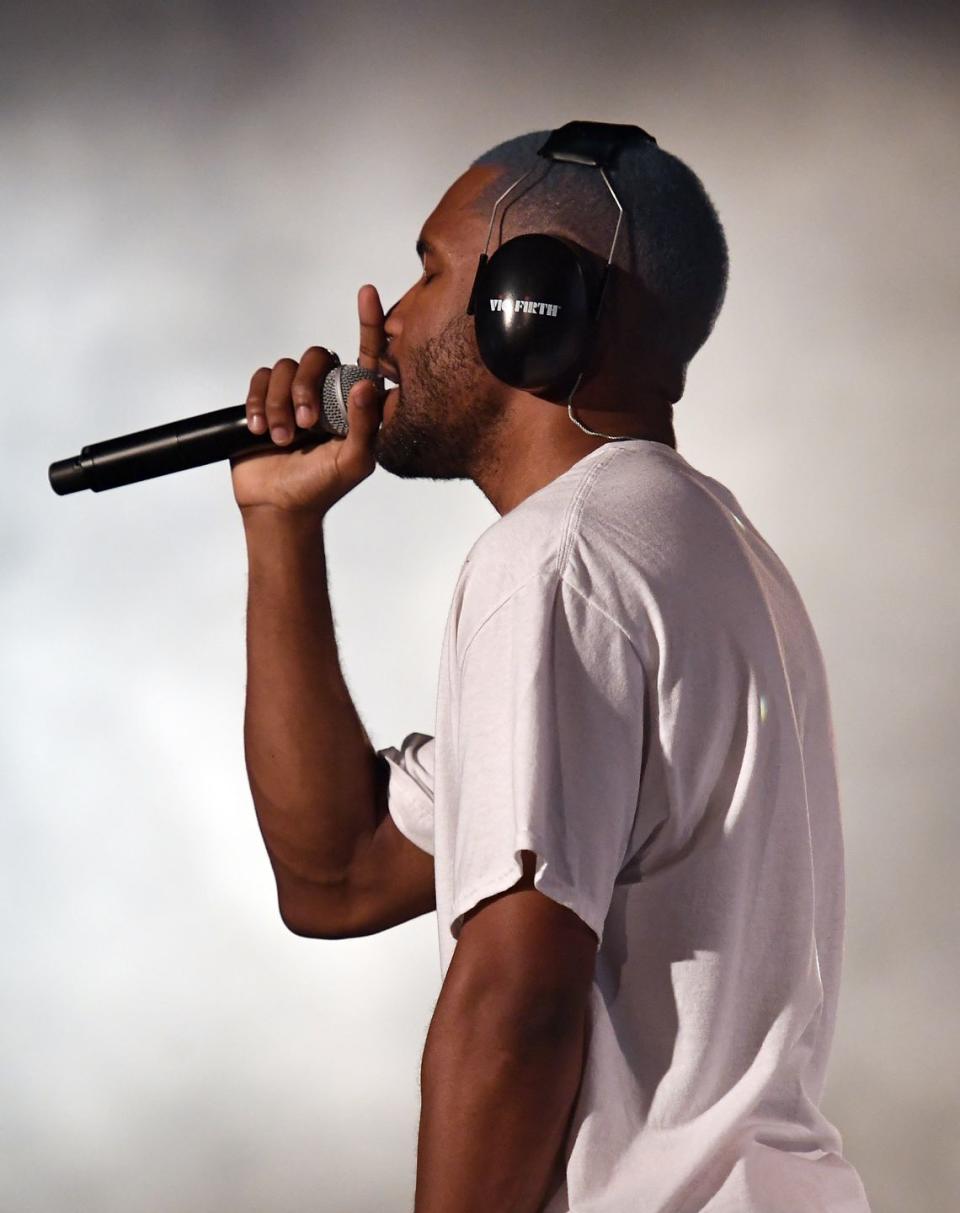Frank Ocean Started the Conversation. It’s Nowhere Near Finished.

Frank Ocean was readying the release of his official debut album, Channel Orange, when he was hit with the rumor that routinely plagues male pop stars: that he was gay. An advanced review of the album took notice of Frank’s use of “he” pronouns on the album’s love songs, and speculation surrounding his sexuality commenced. In response, Frank posted a note on Tumblr ahead of Channel Orange’s release, originally intended to be in the liner notes, in which he tells the story of his first love—a man. And that was that. He made no grand declaration about his sexuality, assigned himself no label, only described a youthful and unrequited love for another man that left such an impact it served as the inspiration for the music that would be his formal introduction to the world.
It will probably always be described by some as a “coming out” story, our standard shorthand for queer people telling everyone else the details of their sexuality. I don’t wish to take anything away from anyone for whom coming out was momentous, but it comes across as language that centers the cis-hetero experience of a queer person—that they are revealing something hidden, perhaps even shameful, or slightly dangerous that a cis-hetero person needs to be made aware of. What Frank did was more akin to what writer Darnell L. Moore has referred to as “inviting in”—he lived his life, fell in love, had his heart broken, and in sharing his story, he invited the rest of us to feel the perils of love and heartbreak too.
Frank Ocean was 24 years old, a Black boy from New Orleans, standing on the verge of stardom, and rather than let shame be foisted upon him via rumor and speculation, he invited us all to share grief, reemergence, and art making as a man who romantically loved another man.
This was pre-Moonlight. This was pre-Lil Nas X. And even though Frank was standing on the shoulders of the shoulders of the many queer Black performers who came before him, whether they invited the rest of the world in or not, he marked a generational shift. His invitation was an opening to love all of him—the way he sings, the songs he writes, the truth of who he loves.
In order to talk about Frank Ocean, I have to talk about Luther Vandross. His music is the most enduring sound of my childhood, because my mother, like maybe 90 to 95 percent of Black women her age, listened to and loved Luther religiously. My mother has never been much of a dancer—at least not in my lifetime, though I’m sure she got down before I came around—but you could count on a little shoulder shimmy and head bop from her whenever “Give Me the Reason” or “Bad Boy/Having a Party” or “Power of Love/Love Power” was on. And while she may not have said it at the time, I’m almost certain whenever she turned the volume up on “Anyone Who Had a Heart,” she was sending a not-so-subtle message to my father. No clue if he ever picked up on it.
Luther Vandross was ubiquitous growing up. But I can only recall one time where my mother made any mention of his sexuality. I believe it was because one of my cousins was teasing her for loving Luther so much even though he wasn’t singing his songs to women—the rumor that Luther was gay was considered an open secret, and my cousin was noting that many of his love songs didn’t feature the pronouns “she” or “her” as evidence of the rumor’s veracity. My mother’s response was that it didn’t matter; she loved Luther’s voice, his songs, and who he was singing to was none of her business. And Luther never made it her business. For all the rumor and speculation and “open secret” stuff that floated for years, Luther kept the issue of his sexuality a private matter until his death in 2005.

Frank Ocean represented possibility to the boys like me who grew up on Luther Vandross’s smooth voice and the chatter that threatened to drown it out, knowing there was something to be feared for him, for us, if he was ever “found out.” It wasn’t only fear of being named gay, but any deviation from the hetero norm. The invitation was to consider all those times we changed the pronouns when singing along to female R&B singers, so we wouldn’t be thought suspect, and what was lost in not allowing ourselves the freedom of desire. It called upon us to think about how we gossiped about who was “the gay rapper” (as if there was only one) and why it mattered so much to out him. With Frank, shy and reclusive, it meant that coming out didn’t have to mean a performance of your sexuality that hewed toward well-worn stereotypes. There felt like a place, for the boys like me, who have always experienced sexuality as something fluid, to give ourselves permission for the exploration of suppressed desires.
It is a lot for one moment, one person, to carry. Frank Ocean shouldn’t be tasked with bearing that load alone. But the power of that moment is reflective of the hostility that preceded it. Frank was able to break through because we needed him to; the dam had built up too much pressure. He had to represent all of us, because he got through first.
But representation is not a cure-all; as a political project, representation is facile at its best, repressive at its worst. Frank Ocean is not every queer person, every queer Black boy, every queer story. To love him is not to love every person like him, nor is it a substitute for fighting for queer lives and their survival. If the 10 years since his inviting us in have not taught us that moments like that are not enough, the failure is our own. You can’t say gay in Florida. You could face criminal charges for providing medical care to trans youth in Texas. Clarence Thomas would like to roll back marriage equality. The teenage boys on my local basketball court still insult each other by using anti-gay slurs.
There is a much greater fight left to ensure a world where queer lives are valued and every queer person is guaranteed the freedom to be, to love, to fuck, to fuck up, to be given a second chance, to be safe, to be sheltered, to be loved, to live without constant fear. We are woefully, tragically, epically far from that world. Frank Ocean’s invitation did not remake the world in his image. Asking it to do so would be unfair.
What it did, all that it could do, was ask us to consider ourselves anew. Coming back to Luther Vandross, it was his business whether or not to make his sexuality our business, and he chose not to, which was his right. But what if he had? What if it were true? What if my mother had still sung those songs alongside him? What if she danced with me while Luther sang sweetly of loving another man? There’s a version of myself that may have gone into the world feeling more open to its erotic potential, more in touch with my own sense of who and what I wanted, who may not have held onto any secret shame, who would have been given language to talk about those desires within a community of people who shared them without thinking that at any moment a thunderous judgment may come down on me from which I would never recover. I wish I were that version of myself; I’m not quite there.

And it’s still unfair of me to put that responsibility on the dead shoulders of Luther Vandross. He didn’t make the world, he only responded to the hostility he inherited. He is not at fault for surviving.
But this is why Frank Ocean means so much. It may be too late to recover that lost version of myself, but there are queer Black boys now who will not know a world without Frank Ocean, his art, his invitation, and the ripple effect thereof; who will have a chance to be the truest versions of themselves. They will do so in a world that still fights their existence, but they will have examples of how to resist. They will love one another, even when they are told not to, to hide and be ashamed. They will know that the shame is not theirs to hold.
I wish Luther knew that. I’m glad Frank does. But we are not done.
You Might Also Like
